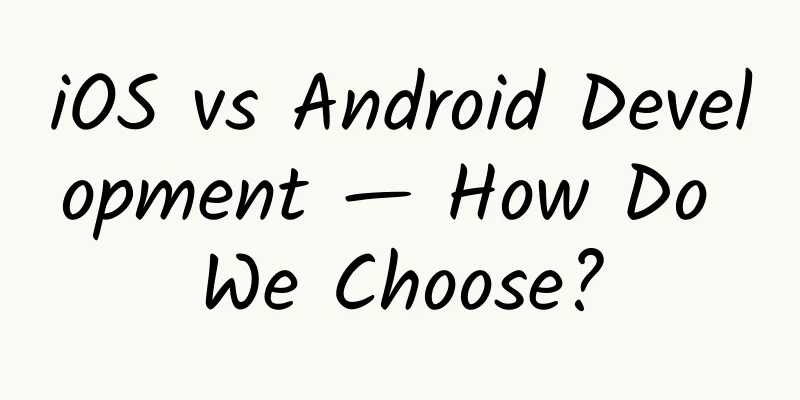iOS vs Android Development — How Do We Choose?

|
【51CTO.com Quick Translation】I believe many of you are interested in mobile application development, but it is difficult to choose the right entry point. In this regard, the first difficulty you face is naturally the choice of a specific mobile platform. Although the current situation is very clear, iOS and Android have occupied more than 95% of the market share, but the further choice is related to the existing technology stack, learning curve and market dynamics and other trends.
Learning Difficulty Although iOS is more mature, has a more complete set of predefined rules, and has more powerful related development tools, on the other hand, Android applications are easier to pass the review of the official app store. With the birth of Apple's Swift programming language, newcomers can learn iOS application development knowledge faster and successfully complete application construction. On the other hand, developers who already have Java knowledge are more inclined to choose the Android development platform - because their original experience can be directly applied to mobile application development. Related requirements Developing mobile applications on any specific platform requires practitioners to have a technology stack, development tools such as Xcode and Android Studio, and related hardware equipment. In the specific development process of mobile applications, we must focus on specific hardware for design, testing and debugging. So what devices do you already have? What operating system does it run? Which mobile operating system do you prefer? Which do you think will provide a better user experience, iOS or Android? Android Studio is compatible with the three major desktop systems of Linux, OS X, and Windows. In contrast, Xcode is exclusive to OS X, which means that Android development work is cheaper for most practitioners. Return Although Android devices have a larger user base than iOS, apps on Apple's App Store tend to generate more lucrative revenues - this is because Apple users are more willing to pay for apps, unlike Android platforms, which can only rely on advertising support. Of course, these two ways of getting returns have their own advantages, and the latter can also provide excellent developers with good income and more flexibility to experiment with their design ideas. In short, while Android provides users with more control and freedom during development, if you have never been exposed to Java programming before, you will face a steep learning curve. On the other hand, iOS's companion language Swift contains a large set of predefined rules that allow you to quickly complete the learning process - but it also limits the developer's ability to modify the application through various default features. How to choose? Please make your own judgment. Original title: Should I Learn iOS or Android Development? Originally Posted by Gurmukh Singh [Translated by 51CTO. Please indicate the original translator and source as 51CTO.com when reprinting on partner sites] |
<<: Technology Post: How to apply AI natively to Android system
>>: Aiti Tribe Stories (10): Voices from Technical Promotion Managers
Recommend
2017 Big Data Festival is coming in October, iResearch A10 Summit will open on the 27th
As a major event in the field of big data in Chin...
#千万IP创科学普# The secret of maritime safety, Fuchuan will tell you
The manufacturing technology of Chinese watertigh...
Talk: How is an excellent community operated?
This article will focus on the management and dev...
iOS13.4beta5 experience sharing, 7P fluency has been improved
iOS13.4beta5 experience sharing Apple released th...
Don't wear silver jewelry randomly, the water inside is a bit deep
In our daily life, we can see a lot of silver orn...
Zeekr Auto: In Q3 2024, Zeekr's total revenue reached RMB 18.36 billion, a year-on-year increase of 31%.
Zeekr Auto released its third quarter financial r...
What procedures are required to use the Huizhou local classified information mini program?
With the increasing popularity of mini programs, ...
How was China's first castle in the air built?
Five Thousand Years of Chinese History We have bu...
The tiny rockhopper penguin is the brightest rock star
Rockhopper penguins are small, with a body length...
36 Strategies for Creative Enrollment Programs
Enrollment is the lifeblood of a school. Without ...
Why did Zhuhai Yinlong's value increase 100 times overnight?
With the support of Gree Electric Appliances Chai...
Yang Kunlong's "Build a Wealth Creation Plan 7-Day Class" 3rd Training Course Video
Yang Kunlong's "Build a Wealth Creation ...
How can I create a high-authority Zhihu account?
When I operate Baidu traffic diversion, I usually...
APP promotion notes: 100 days of free/paid channel promotion summary
Before I did it, I had heard of various methods o...




![[Smart Farmers] Eating and appreciating dates: the date culture unique to the Chinese](/upload/images/67f229bea0dea.webp)




